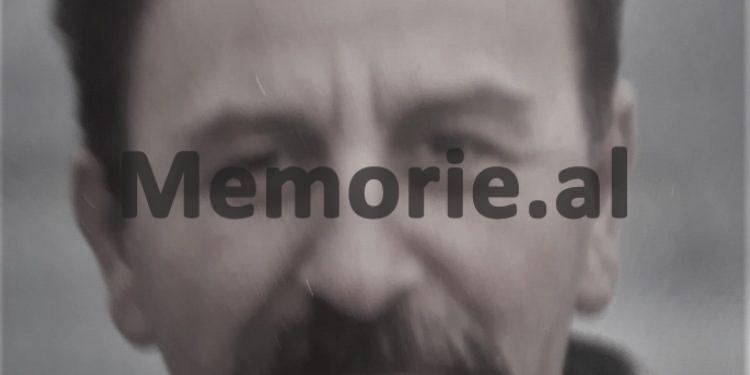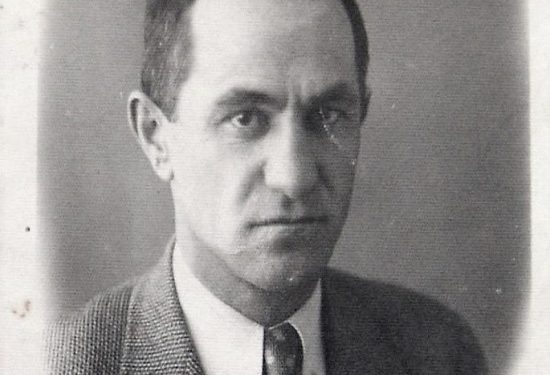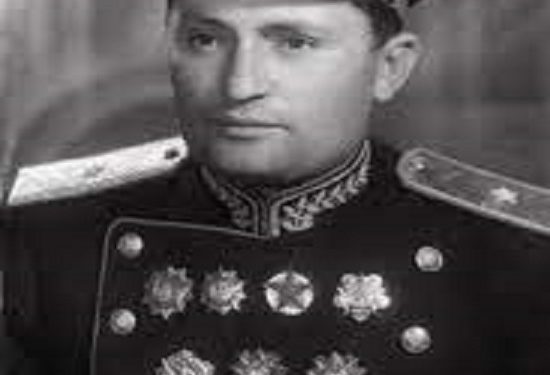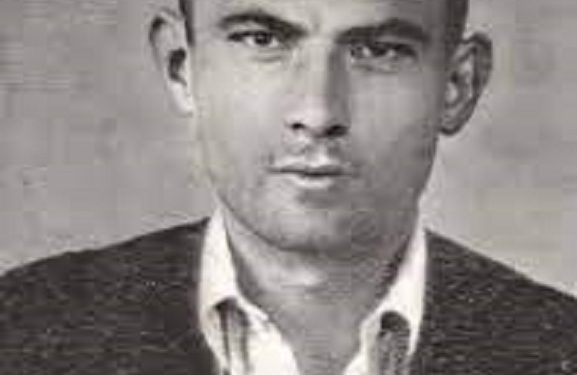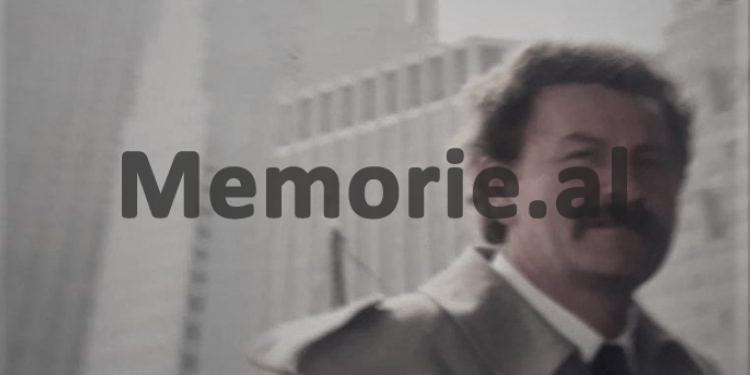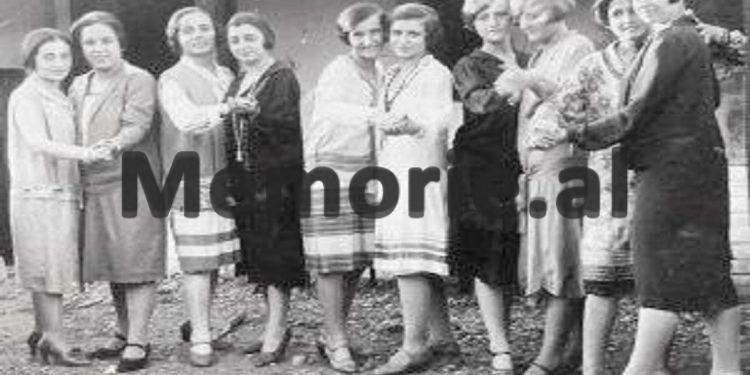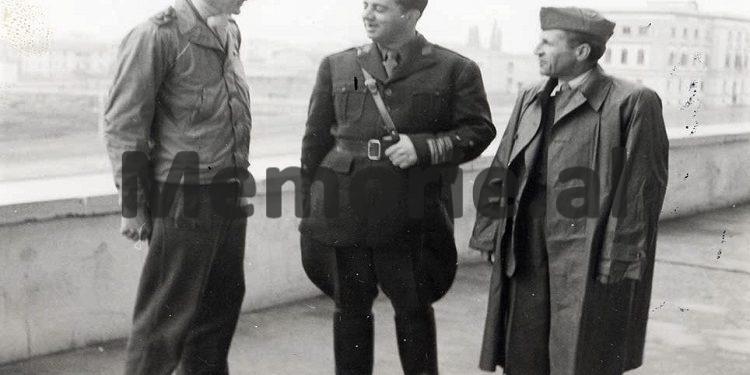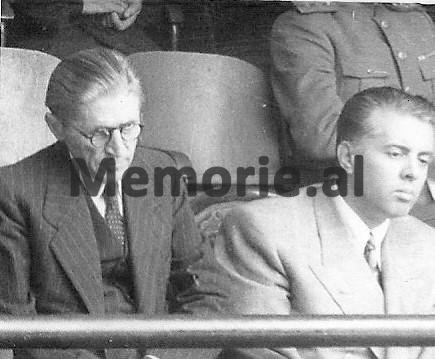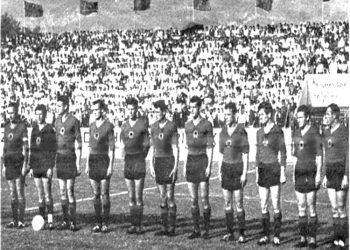By Bashkim Trenova
Part forty-one
Memorie.al publishes the memoirs of the well-known journalist, publicist, translator, researcher, writer, playwright and diplomat, Bashkim Trenova, who after graduating from the Faculty of History and Philology of the State University of Tirana, in 1966 was appointed a journalist at Radio- Tirana in its Foreign Directorate, where he worked until 1975, when he was appointed journalist and head of the foreign editorial office of the newspaper ‘Zeri i Popullit’, a body of the Central Committee of the ALP. In the years 1984-1990, he served as chairman of the Publishing Branch in the General Directorate of State Archives and after the first free elections in Albania, in March 1991, he was appointed to the newspaper ‘Rilindja Demokratike’, initially as deputy / editor-in-chief and then its editor-in-chief, until 1994, when he was appointed to the Ministry of Foreign Affairs with the position of Press Director and spokesperson of that ministry. In 1997, Trenova was appointed Ambassador of Albania to the Kingdom of Belgium and to the Grand Duchy of Luxembourg. Unknown memories of Mr. Trenova, starting from the war period, his childhood, college years, professional career as a journalist and researcher at Radio Tirana, the newspaper ‘People’s Voice’ and the Central State Archive, where he served until the fall of the communist regime of Enver Hoxha, a period of time when he in different circumstances met many of his colleagues, suckers of some of the ‘reactionary families’, etc., whom he described with a rare skill in a book of memoirs published in 2012, entitled ‘Enemies of the people’ and now brings them to the readers of Memorie.al
Continued from the previous issue
WITH “HEROES OF THE PEOPLE”
POLITICAL BUREAU AND THE PRESIDENCY
Why couldn’t Enver leave President Omer Nishani alive?!
After Stalin’s death in the Soviet Union his Gulag policy, murders, internments, imprisonments would be condemned. Omer Nishani could talk to the Russian ambassador again in 1954, or later, as he did in 1948. He knew full well now that it was not Koci Xoxe, the former Chief of Security, who was primarily responsible for the arrests and killings. Without trial, for terror and uncontrolled violence, but Enver Hoxha. It was he who had ordered Koci Xoxen. He also ordered Omer Nishani to sign to approve the execution of the “enemies of the people”. Now Omer Nishani could talk about being calm with his conscience, but also for fear of suffering like Koci Xoxe. It was never known who the next “Koci Xoxe” would be! That is why he had to shut up without expecting a natural death. Enver Hoxha had done this before with others, he would do it in the following years until the end of his life. Witnesses to crimes had to be eliminated, they had to be convicted. By acting in this way, the crime remained unauthorized, the criminal presented the witness or accomplice as its perpetrator and he remained intact, honored, on the pedestal.
Recently published Soviet archive documents show, for example, that on May 20, 1949, Enver Hoxha told the Kremlin ambassador to Tirana, DS Chuvakin: “The prosecutor should seek the death sentence for Koci Xoxen, life imprisonment for Pandi Kriston, while for the other defendants – Vaskë Koleci, Nuri Huta and Vangjo Mitrojorgji, the court should sentence them to 10-15, 7-8 and 3-5 years in prison, respectively.” He has always been the supreme prosecutor and judge in dictatorship.
In the conversation with the Soviet ambassador, Omer Nishani also spoke about the Albanian-Yugoslav relations, about the colonial policy of the Yugoslavs towards Albania. According to him, he learned this only from the First Congress of the Communist Party of Albania, especially from the report on economic problems, presented by Gogo Nushi, then minister in the cabinet of Enver Hoxha. This does not seem very credible, but it is not in the interest of further development. So, I’m going back to the Soviet ambassador’s diary. Çuvakin writes in his diary that: “in the opinion of Omer Nishani, all this happened because the Albanian leaders had forgotten the sense of personal dignity …”!
Here Omer Nishani speaks in general without sparing even Enver Hoxha. Has Enver Hoxha been informed by the Soviets about Omer Nishani’s conversation? Why not? We know of other cases where they have made him aware of it and there is no reason in this case to make an exception. Even the Soviets have made their own policy, i.e., those “friends” with everyone in the dome and everyone in the dome enemies among themselves. Enver Hoxha could not forgive what he pointed out to others, to the emissaries of the communist Vatican, the “lack of personal dignity” even though this lack was appreciated, was a favorable card for him in the ‘Kremlin Tower’.
He, throughout his political career, from its inception to its end, has in fact shown a complete lack of personal dignity, becoming the flatterer of the most thoughtless communist leaders, whose vassal he was, according to eras and circumstances, namely: Tito, Stalin, Khrushchev and Mao Zedong. Everyone has been twisted and twisted like a street woman, everyone, except Stalin, has been cursed and spat at when they wanted to get rid of her neck. He has presented this behavior as dignity, not only personal, but also of the country and the people he has led!
The departure from Albania of the Austrian wife of Omer Nishani?!
After the death, murder or suicide of Omer Nishani, his wife, Trëndafilja, constantly insisted on leaving Albania. Apparently, she did not feel safe because she too knew a lot about dome life. Now she was utterly defenseless, against every unpleasant surprise of every arbitrariness. Years passed and her requests were constantly rejected accompanied by high considerations. She was told that she could not be allowed to leave because it was allegedly not in the country’s honor for the wife of the first president of the Presidium of the People’s Assembly to live abroad.
After many unsuccessful attempts, someone advises Trendafili to write to Enver Hoxha. She writes to him, tells him that she is old, that she is sick and that like everyone else, she too wanted to die in her homeland, where she still had a single friend waiting for her, that now she was expecting nothing else from life except death. She begged him not to let her die alone, without anyone around, to close her eyes, to follow her with pain and love. And, the “surprise” is that this time he did well. The dictator gave his consent. Why? I cannot say for sure. Maybe he too, no matter how cruel he was, happened at some point outside of his being and judged as a human being. Perhaps he reasoned that in the last thunderstorms, the Rose had no chance, no energy to devote to the past. The past would soon close with it.
The rose left Albania taking with her only Troll, her faithful dog with whom, as I will write in her letters, she continued to speak Albanian. She never forgot Albania, which she valued as her second homeland. On December 5, 1968, she sent me a postcard, which read: “You have the right to Union. Not only did I remain an Albanian with a passport, a citizen, I hold your prestige high, but I have the country in my soul. I have seen the war, the revolution, the sacrifices you have made, I have lived, honored and accepted them”! Her health is getting worse and worse, death is getting closer and closer. On August 30, 1969, she wrote from Frankfurt on Main: “Now the doctors are amazed at how I escaped! But I knew: 1) -I am a poet. 2) -Albania has hardened me. My hearth is small but sweet. On August 19, 1970, she will write to me: “I still dream of seeing you once again in beautiful Albania, where I have spent half a century of my life …! I hug you. Forgive my mistakes Roses. My faithful Troll died, my friend. I was left alone”!
Subsequent letters or postcards will always be very much for Albania and will express its only hostage, that of returning once again to the place where she lived for half a century, enough to say goodbye before she died. Her health is getting worse. On April 5, 1970, she sent me a postcard that read: “Dear Bashkim. I have been without news for a long time. I am not in good health, I am old but I do not want to die before I see Albania goodbye once again…! I hoped to see you all, but it came out. Union, write Roses! Spring has not come here yet. “Nature will have flourished there.”
The last two letters that Omer Nishani’s wife sent me from Austria in 1970!
On December 19, 1970, she will send me the last letter, always with the same longing and desire to return to Albania. In this letter she writes to me: “The year ’70 has been good for me before. To be honest, I could not write due to health problems. Get old and eat it damn…! That’s why I could not come this year. But I still hope I can come in 1971. I was very sick when I left. I left everything there, the small and sweet hut, Dajti mountain, the alleys and the loyal friends. How empty I looked with Troll alone. But I was wrong, I had taken the love with me and I did not lose it, I did not lose the connections with Albania …”!
In fact, the last “letter” from Rose reached me on July 19, 1971. In fact, it is not a letter, but a newspaper page. It is page 12 of the German newspaper “Landeszeitung” dated June 14, 1971. It contains a photo from the football match Germany – Albania, in the stadium of Karlsruhe in Germany. This match ended with the result 2 to 0. The article published on this occasion in the German newspaper is titled: “No recipe against Albanian super concrete.”She, who in her life had never been interested in football, like me, was happy for the game of Albanian footballers. Being powerless to express joy even in two or three words, to share it together, she tore up this newspaper page and sent it to me. I do not know how long Rose still lived afterwards. I know for sure that she died in 1971.
The enigmatic suicides of Omern Nishani and Mehmet Shehu!
It is interesting to see the same similarities and the same mystery in the murder or suicide of Omer Nishani and in the murder or suicide, 27 years later, of former Prime Minister Mehmet Shehu. In both cases, he is formally charged with two counts of suicide as a result of a serious illness or a nervous breakdown. This is understandable even if the truth is quite different. It is further seen that both of these senior leaders of the ruling communist dome have been denigrated, humiliated, monitored on the eve of their assassination or suicide. Both are buried without the honors that belonged to their post. There is, however, a difference between the last of Omer Nishani and that of Mehmet Shehu. Their elimination is not done for the same reasons. If it can be thought that Mehmet Shehu endangered, perhaps, the power of Enver Hoxha, if he endangered especially the power of Nexhmije Hoxha, after Enver’s death, Omer Nishani has never posed any such or similar danger. For this reason, perhaps one of them, Mehmet Shehu, declared himself an enemy, an agent and a poly agent, while the other, Omer Nishani, spared himself from these epithets.
He was forgotten until 1989, when a hospital in Gjirokastra, Omer Nishani’s hometown, was named after him. Even when the bells were ringing for communist power, he was lukewarmly remembered for it. Another change may be in the attitude held towards the spouses of Mehmet Shehu and Omer Nishani. Mehmet Shehu’s wife, Fiqerete Shehu, was forced to make allegations against her husband in the investigator and in court. She had children and, when all was lost, she thought she could protect them. Trëndafile Nishani, was left in oblivion as well as her husband. She had no children, she was not a mother. This was probably one of the rare occasions when a woman could feel happy to have no children.
I also had the opportunity to meet with Fiqrete Shehu and the ‘People’s Hero’, Mehmet Shehu. I “met” Fiqreten for the first time when I was a student. In those years, the Tirana Opera and Ballet Theater retired at the peak of its artistic career, some excellent artists, whose only sin was that they had finished their studies before the War in the West. One of them was the great lyrical singer, or as she will be described in a publication of recent years, “the lady with the soul of the Albanian Opera”, Gjyzepina Kosturi. I adored Giuseppe in her roles. It seemed to me that an injustice was done not only to her, but also to me and all the spectators of the Albanian Opera. I had heard from my uncle’s wife, Valeria Drenova, who was a pianist at the Opera House, that Fiqrete Shehu showed a special care for lyric artists.
My letter to Fiqrete Shehu, where I prayed for Gjyzepina Kosturi!
I wrote a letter to Fiqrete Shehu, expressing my opinion on the extraordinary vocal and interpretive qualities of soprano Gjyzepina Kosturi and, in the end, I begged her to intervene and not allow her to be forced to retire. Since I have always had bad writing, I asked a classmate, Sezai Sinani from Selenica, Vlora, to copy the letter. Sezaiu, a resentful lab but also a friend of the faith, accepted and after copying it, without questions or comments, returned it with a laugh. I posted the letter to the address of the Party School “V.I.Lenin” whose director was Fiqrete Shehu. It was certainly a failed attempt. I did not know, nor could I understand then, that the Party had its own cadre policy, that it should stage new artists whom it had sent to study in the Soviet Union or elsewhere in Eastern Europe communists, as well as those who would graduate in Albania. This would show her care for art and the victories of socialism in this field would be announced!
Only after a few years have passed, Gjyzepina Kosturi or, as her friends called her, Gjyzja, will learn about my letter to Fiqerete Shehu. It was Lili Tafaj, the talented pianist of the Tirana Opera and Ballet Theater, with whom I was connected by an old company, who had spoken to Gjyzepina about my letter, as well as about me, “Little Migjen”, as she called me she does not know why. I later learned that Lily had her heart poet the great Migjen, the poet of pain and youth.
After so many years, Gjyzepina Kosturi, as a sign of gratitude, comes to the small piano studio of Lili Tafaj at the Opera House and improvises a small “concert” with arias from well-known operas, just for me. In fact, I even called my friend, Lulzim Hana, to this mini concert. Dhurata Koshi, invited by Lili Tafaj, would also be present.
Lili accompanied Gjyzepina on the piano. She was always as wonderful as in the years when she owned the Opera House stage. I felt the same admiration I had had over the years for him, but now also regret and sadness. I applauded her heartily and she bowed like a great lady before a gentleman of another era, not before a boy who still did not understand from her life and traps. Maybe it was the last applause of a spectator for Gjyzepina Kosturi! After Gjyzepina, the “concert” Lili Tafaj continued. She played Chopin’s “Warsaw”. Lily was the cheerful, even noisy, bubbling guy in her joy, but that day tears fell on the keyboard.
In fact, Lili Tafaj, despite her appearance, was not and could not be happy in life. She was the daughter of the well-known intellectual and lawyer Jonuz Tafai, arrested by the dictatorship in 1947 and imprisoned in 1948. From my mutual friends, I learned that Lili had been in love with a football player of the “Partizani” team. a handsome boy with a strong physique, originally from Lushnja, or a resident of Lushnja seems to me. Even in love Lili was unlucky. She remains alone with her piano. There, in front of the keyboard she eased the sadness.
From Lily I save a postcard she sent me from Beijing in May 1972. In concise writing she seeks to show how happy she is not only that she was discovering a new, unknown world, but as she writes, because “here I also have the great pianist Chen Pin Gan. “In a word, I pass a masterpiece”, writes Lili, not forgetting to add with humor that “I keep diets here too”. Then they continue to say goodbye to my colleagues at Radio Tirana. She is careful that even from thousands of miles away, she does not forget any; Lulin, Halimena, Natasha, Glinka, Bardhi. We today, almost, do not know where one or the other is. Life crashed us thousands of miles apart. We all, without exception, experienced the fate of exile.
In this small “concert” in Lili Tafaj’s studio at the Opera and Ballet Theater, we did not mention either Fiqrete Shehu or the letter I had addressed to her during my student years. The fig tree, apparently under a tacit agreement, was archived in our oblivion, at least to this day. After a few years, the occasion brought me to meet her and her husband, Mehmet Shehu.
My meeting with Mehmet Shehu in 1979, after the failure of the great training, “Biza”!
I met for the first time with Mehmet Shehu, the longest-serving Albanian Prime Minister, in early 1979. This meeting was of a special kind. The military unit that bore the name of the “1st Assault Brigade”, organized the exercise codenamed “Biza”. The exercise took place in extremely difficult climatic conditions, completely unprepared and the result was not long in coming: The complete destruction of the Brigade. There were also some victims who were said to have been eaten by wolves or who ended up somewhere in the abyss. Only one victim was officially admitted, but even for that no one was worried, no one was held accountable, not even discussed.
The name of the “1st Assault Brigade” was associated with the name of Mehmet Shehu, who had been its commander during the war years. To present himself as a hero, he had woven whole legends about the heroism and glory of this Brigade. He could not agree to the defeat of the Brigade in peacetime, in a military exercise. Moreover, at that time, in addition to the post of Prime Minister, he also had that of Minister of Defense. In fact, it was no longer the same Brigade, it was not even an ordinary military Brigade that had been defeated, but a Brigade with reserve soldiers, a Brigade whose members or troops were ordinary employees, peasants of the provinces of Tirana. The brigade thus represented not the Albanian army, but what at that time was called the “Army of the People Soldier”, ie the people recruited soldiers. According to communist dogma, in Albania all the people were soldiers and in defense of socialism. For this, every citizen or villager of Albania, performed compulsory military service, 20 and 25 days a year, until the age of 50 or 55.
All citizens or villagers, who had not reached this age, gathered in various military centers, which were found like mushrooms all over Albania. This type of army, according to the Albanian dictator, was already capable of fighting and winning against numerous enemies, against the superpowers of the time and their military alliances, NATO and the Warsaw Pact separately, or even if they were to become together! According to Mehmet Shehu, the armies of countries such as the United States of America, the Soviet Union, not to mention their allies, did not know how to fight and win because their soldiers were “cotton ass.” The soldiers of socialist Albania kneaded with the teachings of the Party and Comrade Enver Hoxha, unlike them, “danced in the mouth of the wolf”. And here, 100 kilometers near Tirana, not in conditions of war, not even from the “unscrupulous ass”, happened the complete destruction of one of the most famous structures of the army. I was also an effective member of this Brigade, but I did not participate in this exercise. I do not remember how it happened. I believe since I worked in “Voice of the People”. Maybe the editor-in-chief must have asked to be excluded from this exercise.
The complete failure and glorification of the “Biza” exercise was accompanied by a state of anxiety in the capital. This is due to the fact that the employees of the Albanian Radio and Television, who took part in it, pleaded guilty to its failure. According to the official version, they wanted to return to Tirana as soon as possible, so as not to miss the opportunity to watch a football match. This desire of theirs led to the anarchy and defeat of the Brigade. It is certainly a very naive excuse, but that did not stop Mehmet Shehu from ordering all the reservists to take part in that exercise, somewhere near the Stalin Textile Factory on the outskirts of the capital. I was also present at this gathering. They gave us a Kalashnikov and made us walk in a row, with Kalashnikovs on our chests, as if in a parade. We did some rehearsals in front of the tribune where Mehmet Shehu was expected to climb. When Mehmet Shehu climbed the podium, we passed in front of him, stretching his step and tensing his muscles, hoping that we would soften his anger a little. Mehmeti did not hesitate to use the language of “handcuffs”. He threatened with a military trial and demanded that the honor of the 1st Brigade be restored, i.e., that the “Biza” exercise be started again from the beginning. Memorie.al
The next issue follows




